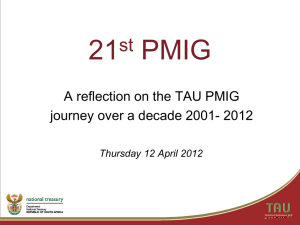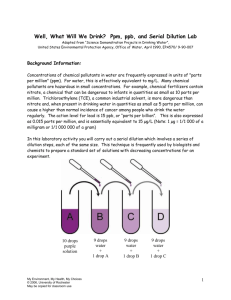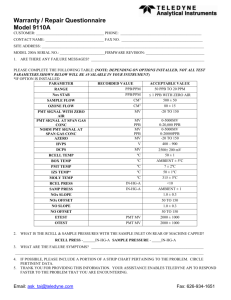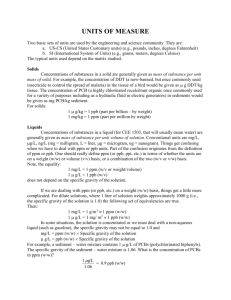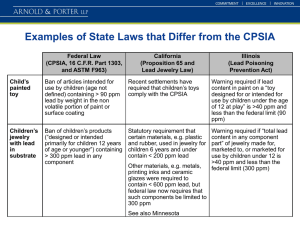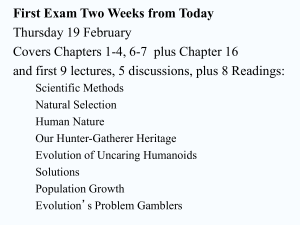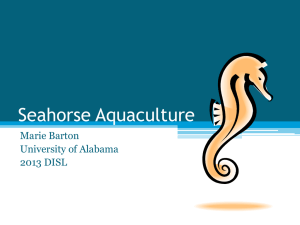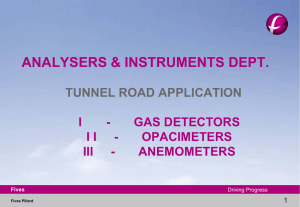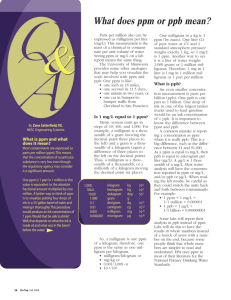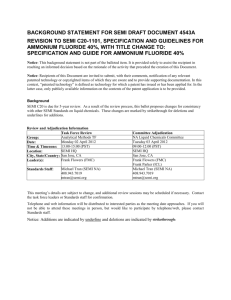Brettanomyces Aroma and Flavor Effects
advertisement
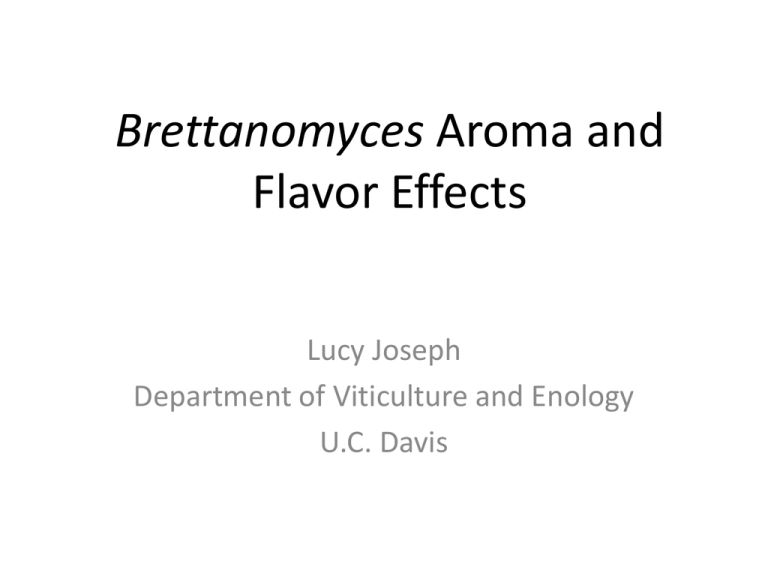
Brettanomyces Aroma and Flavor Effects Lucy Joseph Department of Viticulture and Enology U.C. Davis Brettanomyces Aromas in Wine • • • • • • • • • Horse sweat - Leather Earthy Medicinal Band Aid Smoky Tobacco Barnyard Putrid Lilac Brett Effect in Wine • • • • • • • Loss of ‘fruit’, ‘floral’ & ‘honey’ aromas Increase in overall complexity Acetic acid, vinegar aroma Spice and smoke aroma Chemical, Plastic, BandAid aroma Metallic bitter taste Mousiness Chemicals Produced Chemical Type Odor Impact Detection Threshold Ethyl Phenol Chemical, Band Aid, smoke, burnt, medicinal, spicy 0.14 to 0.62 ppm Vinyl Phenol Leather, burnt, metallic, woody 0.1 to 15 ppm Fatty Acid Barnyard, sweat, rancid, solvent, sewage 5 ppm Pyridine Mousy, rancid tortilla chips, crackers 2 to 18 ppb Aldehyde Solvent, burnt rubber, air freshener 1 to 100 ppm Long Chain Alcohol Floral, fruit, chemical, furniture polish 0.1 to 50 ppm Ester Fruit, floral 0.1 to 100 ppm Terpene Spicy, floral, resin 0.1 to 0.5 ppm Where Do These Chemicals Come From? • Vinyl and Ethyl Phenols from Cinnamic Acids Fatty Acids From Amino Acids and Sugars Fatty Acid Synthesis Mousiness from Lysine ETHP = 2-ethyltetrahydropyridine ATHP = 2-acetyltetrahydropyridine E.M. SNOWDON, M.C. BOWYER, P.R. GRBIN, P.K. BOWYER J. Agric. Food Chem. 2006, 54, 6465−6474 Aldehyde Synthesis From Organic Acids Alcohols From Amino Acid Ester Synthesis From Alcohols Terpene Biosynthesis From Sugars IPP = isopentenyl diphosphate acetyl-CoA = acetyl coenzyme A HMG-CoA = 3-hydroxy-3-methylglutaryl coenzyme A DMAPP = dimethylallyl diphosphate FPP = farnesyl diphosphate GPP = geranyl diphosphate Recent Genome Sequence Analysis Linda Hellborg and Jure Piškur, Department of Cell and Organism Biology, Lund University, Sweden • Brettanomyces bruxellensis is either a result of a hybridization event where two similar genomes fused together. Or the common progenitor of the modern isolates lost its sexual cycle and the initially diploid genome now accumulates mutants. • The existence of two “independent” genome copies, as well as additional duplications, presents the basis for a tremendous variation in the number and sizes of chromosomes. • Such a degree of variation has never been observed before within isolates belonging to the same species. Lactic Acid Bacteria Found in Wine • Lactobacillus – Lb. brevis, Lb. casei, Lb. hilgardii, Lb. plantarum, Lb. lindneri, Lb. kunkeei • Pediococcus – Pd. damnosus, Pd. parvulus, Pd. ethanolidurans • Oenococcus – O. oeni Spoilage Compounds Produced by Lactics Bacteria Compound Sensory Effect Threshold LAB Acetic Acid Vinegar, pungent, sour 0.2 ppt LAB Ethyl acetate Nail polish remover 7.5 ppm Lb., Oeno. Diacetyl Butter, nutty, caramel 0.1 to 2 ppm Lb., Pd. 2-Ethoxy-3,5-hexadiene Geranium leaves 0.1 ppb Lb., Oeno. 2-Acetyltetrahydropyridine Mousy 4 to 5 ppb Lb., Oeno. 2-Ethyltetrahydropyridine Mousy 2 to 18 ppb Lb., Oeno. 2-Acetyl-1-pyrroline Mousy 7 to 8 ppb Lb., Pd. Acrolein (+anthocyanin) Bitter Pd. b-D-Glucan Ropy, viscous, oily Oeno. Mannitol Viscous, sweet LAB Skatole (indole) Fecal LAB Biogenic Amines None (headache) Letters in Applied Microbiology 48 (2009) 149–156 ; E.J. Bartowsky 1.7 ppm (1.8) Where Do These Chemicals Come From? Metabolic Pathways Metabolic Pathways (Indole and Skatole) Skatole Metabolic Pathways (Biogenic Amines) Writing about spoiled wines by lactic acid bacteria: Monitoring Lactic Acid Bacteria • Microscopic examination • Plating • Q-PCR Monitoring for Brettanomyces Contamination • • • • • Microscope Plating Q-PCR ELISA Assay Ethyl phenol production Images of Lactic Acid Bacteria Pediococcus Oenococcus Lactobacillus Microscopic observation Plating on Selective Media • We use MLAB (0.5x MRS with 100 ml/liter of V8 juice) for lactic acid bacteria • We use Wallerstein nutrient agar with cycloheximide (WLD) for Brettanomyces bruxellensis • Bacteria are very dark green, small colonies on WLD • Brett grows very slowly, if at all, on MLAB Colony Morphology Q-PCR SYBR Green PCR Chemistry 1. Target Gene 2. PCR 3. SYBR Green binds ELISA Assay Antibody assay Summary Acknowledgments • • • • • Linda Bisson Bisson Lab American Vineyard Foundation California Competitive Grants Volunteers

